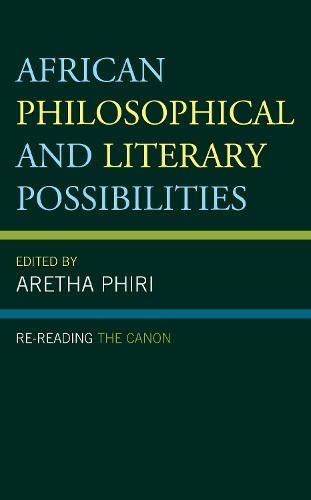
African Philosophical and Literary Possibilities: Re-reading the Canon
(Hardback)
Available Formats
Publishing Details
African Philosophical and Literary Possibilities: Re-reading the Canon
By (Author) Aretha Phiri
Contributions by Oritsegbubemi Anthony Oyowe
Contributions by Chielozona Eze
Contributions by Pier Paolo Frassinelli
Contributions by George Hull
Contributions by Lisa Treffry-Goatley
Contributions by Marzia Milazzo
Contributions by Roco Cobo-Piero
Contributions by Pedro Tabensky
Bloomsbury Publishing PLC
Lexington Books
23rd June 2020
United States
Classifications
Professional and Scholarly
Non Fiction
African history
Literature: history and criticism
199.6
Physical Properties
Hardback
180
Width 158mm, Height 229mm, Spine 16mm
426g
Description
Recognizing philosophys traditional influence onand literatures creative stimulus forsociopolitical discourses, imaginations, and structures, African Philosophical and Literary Possibilities: Re-reading the Canon, edited by Aretha Phiri, probes the cross-referential, interdisciplinary relationships between African literature and African philosophy. The contributors write within the broader context of renewed interest in and concerns around epistemological decolonization and to advance African scholarly transformation . This volume argues that, in their convergent ideological and imaginative attempts to articulate an African conditionality, African philosophy and literature share overlapping concerns and aspirations. In this way, this book engages and examines the intersectional canons of these disciplines in order to determine their intra-continental epistemological transformative possibilities within broader, global societal explorations of the current moment of decolonization. Where much of the scholarship on African philosophy has focused on addressing issues associated with the postcolonial task of African self-assertion in the face of or against Euro-modernist hegemony, this innovative book project shifts the focus and broadens the scope away from merely discoursing with the global North by mapping out how philosophy and literature can be viewed as mutually enriching disciplines within and for Africa.
Reviews
Born from reflection on upheavals in South African universities, from 2015 to 2017, over tuition hikes and an excessively colonial curriculum, this volume opens and closes by looking at what it means to do philosophy with and on behalf of an African conscience. Both contributed by Phiri (literary studies in English, Rhodes Univ., SA), these two pieces critique nationalisms that presume the meaning of "African" while leaving room for one, like Steve Biko's, that resonates with diasporic black struggles. Intervening essays connect the idea of "Afropolitanism" to global crises confronting women rather than to the international experiences of African elites, and expand Ngg wa Thiongo's reasons for promoting indigenous languages in light of digital media and online publishing. Contributors mine Nigerian, South African, and Algerian novels for their insights into intergenerational communication, authentic versus merely instrumental compromise, and the existential meaning of oppression rather than (exclusively) anticolonial content. One particularly interesting essay addresses the interplay between filmic and literary representations of alternate African futures in Nigerian science fiction. A good introduction to recent thinking about the intersecting functions of African literature and philosophy in the academy and in popular culture (including children's literature), this collection could be a valuable resource for courses on world literature or philosophy. Summing Up: Recommended. Lower-division undergraduates through faculty.
Each essay is testimony to the rich and often surprising intellectual journey that results when African literatures and philosophies are brought into mutual conversation. Phiri's deftly curated and wide-ranging collection throws fresh light on contemporary questions around epistemological and conceptual decolonization in (South) Africa. Read together, these essays posit Africa, and its philosophies and literatures, as an ongoing, exciting task, rather than a static given with clear boundaries. By showing rather than telling, the book as a whole presents a generous invitation to a global audience from both disciplines to participate in African intellectuals' attempt to "reimagine the continent and its subjects."
Author Bio
Aretha Phiri is senior lecturer in the Department of Literary Studies in English (DLSE) at Rhodes University and a research fellow at the Stellenbosch Institute for Advanced Study (STIAS) in South Africa.
